I am solving for f(kx,ky) that satisfies following integral equation, k is vector in 2d
equation:

I am mapping f(kx,ky) into 2d N*N grid and solving a system of total N^2 equations.
from scipy.optimize import newton_krylov
import numpy as n
L=10.0 # cut off of integral
N=100 # number of devision from 0 to L
delta=L/(N-1)
def f0(f): # define a larger matrix used in summation
f1=n.ones((2*N,2*N))
for i in range(0, N):
for j in range(0, N):
f1[i][j]=f[i][j]
return f1
def equation(f):
f2=n.empty((N,N))
for i in range(0, N): # i,j index of k
for j in range(0, N):
sum=0
for a in range(-N+1, N): # a,b index of p
for b in range(-N+1, N):
if a!=0 or b!=0:
for c in range(-N+1, N): # c,d index of q
for d in range(-N+1, N):
if c!=0 or d!=0:
if a!=c or b!=d:
if c!=-i or d!=-j:
sum=sum-delta**2/(delta**2*(a**2+b**2)\
+f0(f)[abs(a)][abs(b)])/(delta**2*((a-c)**2+(b-d)**2)\
+f0(f)[abs(a-c)][abs(b-d)])*(1/(delta**2*((c+i)**2+(d+j)**2)\
+f0(f)[abs(c+j)][abs(d+j)])-1/(delta**2*(c**2+d**2)\
+f0(f)[abs(c)][abs(d)]))
f2[i][j]=sum-f[i][j]
return f2
guess =n.ones((N, N), float)
sol = newton_krylov(equation, guess, method='lgmres', verbose=1)
print(sol)
I first tried with very small parameter l=1, N=4. The solution finding is very slow.
0: |F(x)| = 23.6576; step 1; tol 0.487986
.....
519: |F(x)| = 21.4812; step 3.15471e-09; tol 0.9
.....
957: |F(x)| = 20.4225; step 2.03396e-06; tol 0.899997
.....
and still running.
The initial guess is far from the actual solution maybe that is why. Still I want to know whether it is a good way to use newton_krylov in my case?
Also noticing f(0) should be equal to zero in the actual solution. Is it reasonable to do the summation with exclusion of singular point as the integral?
One more question, how to force f(0,0) in the solution always to be equal to zero?